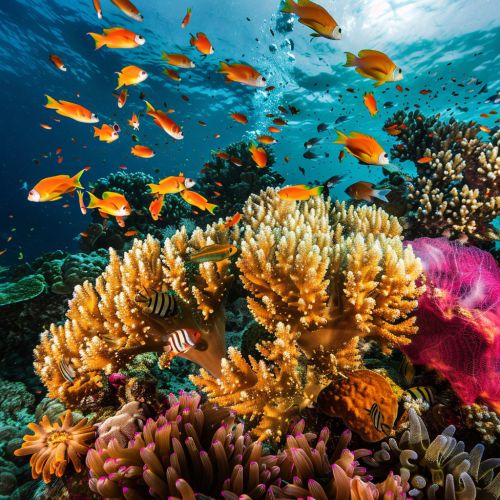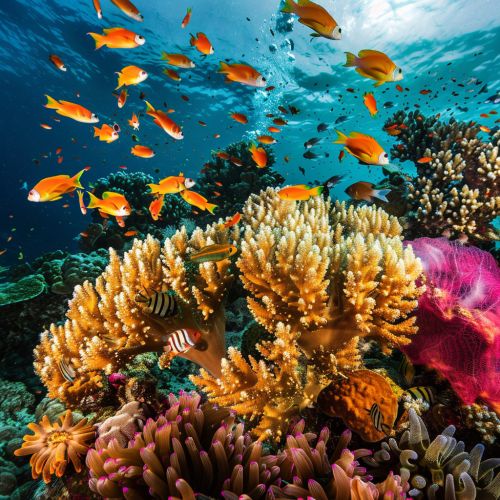Climate Change and the Ocean: Difference between revisions
No edit summary |
No edit summary |
||
| Line 12: | Line 12: | ||
* **Altered Ocean Currents**: Changes in temperature can disrupt [[Ocean Currents|ocean currents]], affecting global climate patterns and marine life distribution. | * **Altered Ocean Currents**: Changes in temperature can disrupt [[Ocean Currents|ocean currents]], affecting global climate patterns and marine life distribution. | ||
[[Image:Detail-97293.jpg|thumb|center|Vibrant coral reef with diverse marine life.]] | [[Image:Detail-97293.jpg|thumb|center|Vibrant coral reef with diverse marine life.|class=only_on_mobile]] | ||
[[Image:Detail-97294.jpg|thumb|center|Vibrant coral reef with diverse marine life.|class=only_on_desktop]] | |||
=== Ocean Acidification === | === Ocean Acidification === | ||
Latest revision as of 13:56, 27 July 2024
Climate Change and the Ocean
Climate change significantly impacts the world's oceans, affecting their physical, chemical, and biological properties. This article delves into the intricate relationship between climate change and the ocean, exploring various aspects such as ocean warming, acidification, sea level rise, and the effects on marine ecosystems.
Ocean Warming
Ocean warming refers to the increase in the average temperature of the ocean's surface waters. This phenomenon is primarily driven by the greenhouse effect, where greenhouse gases trap heat in the Earth's atmosphere. The oceans absorb approximately 90% of the excess heat generated by human activities, leading to a rise in sea surface temperatures.
The warming of the ocean has several consequences:
- **Thermal Expansion**: As water warms, it expands, contributing to sea level rise.
- **Coral Bleaching**: Elevated temperatures cause coral bleaching, where corals expel the symbiotic algae living in their tissues, leading to a loss of color and vital energy sources.
- **Altered Ocean Currents**: Changes in temperature can disrupt ocean currents, affecting global climate patterns and marine life distribution.


Ocean Acidification
Ocean acidification is the process by which the ocean becomes more acidic due to the absorption of carbon dioxide (CO₂) from the atmosphere. When CO₂ dissolves in seawater, it forms carbonic acid, which lowers the pH of the ocean. Since the Industrial Revolution, the ocean's pH has decreased by approximately 0.1 units, representing a 30% increase in acidity.
The effects of ocean acidification include:
- **Calcifying Organisms**: Species such as corals, mollusks, and some plankton species rely on calcium carbonate to form their shells and skeletons. Increased acidity reduces the availability of carbonate ions, making it harder for these organisms to build and maintain their structures.
- **Marine Food Webs**: Changes in the abundance and health of calcifying organisms can have cascading effects on marine food webs, impacting species that rely on them for food and habitat.
- **Behavioral Changes**: Some studies suggest that acidification can alter the behavior of marine species, affecting predator-prey interactions and reproductive success.
Sea Level Rise
Sea level rise is one of the most visible impacts of climate change on the ocean. It results from two primary factors: thermal expansion of seawater and the melting of glaciers and ice sheets. Since the late 19th century, global sea levels have risen by about 20 centimeters, with the rate of rise accelerating in recent decades.
The implications of sea level rise include:
- **Coastal Erosion**: Higher sea levels increase the rate of coastal erosion, threatening infrastructure, homes, and natural habitats.
- **Flooding**: Low-lying areas and islands are particularly vulnerable to flooding, which can lead to displacement of human populations and loss of arable land.
- **Saltwater Intrusion**: Rising sea levels can cause saltwater to infiltrate freshwater aquifers, compromising drinking water supplies and agricultural irrigation.
Effects on Marine Ecosystems
Climate change affects marine ecosystems in numerous ways, altering species distribution, abundance, and interactions. Key impacts include:
- **Shifts in Species Distribution**: As ocean temperatures rise, many marine species migrate towards the poles in search of cooler waters. This shift can disrupt existing ecosystems and lead to the introduction of non-native species.
- **Changes in Phenology**: The timing of biological events, such as breeding and migration, can be altered by changing environmental conditions. This can lead to mismatches between species and their food sources or habitats.
- **Ecosystem Resilience**: The ability of marine ecosystems to recover from disturbances may be compromised by the combined effects of warming, acidification, and other stressors.
Mitigation and Adaptation
Addressing the impacts of climate change on the ocean requires both mitigation and adaptation strategies. Mitigation involves reducing greenhouse gas emissions to limit further warming and acidification. Key approaches include transitioning to renewable energy sources, improving energy efficiency, and protecting and restoring blue carbon ecosystems such as mangroves, seagrasses, and salt marshes, which sequester carbon.
Adaptation strategies focus on enhancing the resilience of marine ecosystems and coastal communities. These include:
- **Marine Protected Areas**: Establishing and effectively managing marine protected areas can help safeguard biodiversity and provide refuges for vulnerable species.
- **Sustainable Fisheries Management**: Implementing sustainable fishing practices can reduce pressure on fish populations and support ecosystem health.
- **Coastal Defenses**: Constructing and maintaining natural and artificial coastal defenses, such as dunes, wetlands, and seawalls, can help protect against erosion and flooding.
Conclusion
The relationship between climate change and the ocean is complex and multifaceted. Understanding and addressing the impacts of climate change on the ocean is crucial for the health of marine ecosystems and the well-being of human societies that depend on them. Continued research, international cooperation, and proactive management are essential to mitigate the adverse effects and enhance the resilience of our oceans.
